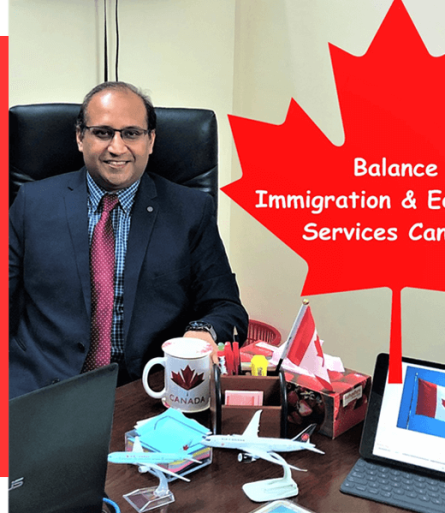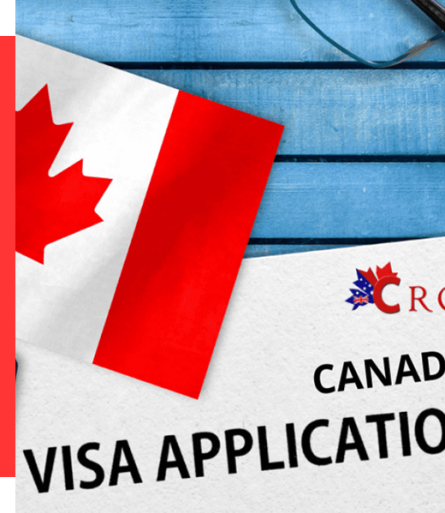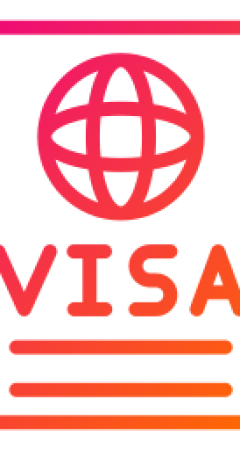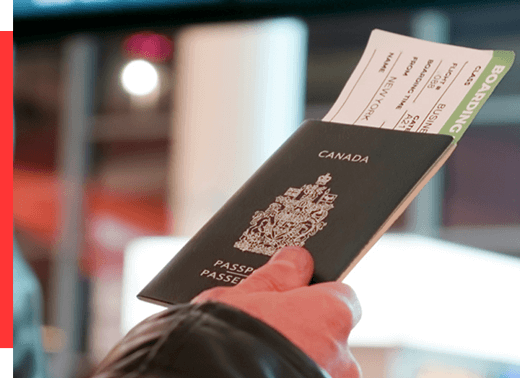Help /
Support
BALANCE IMMIGRATION
Canada Immigration Program
/ COUNTRIES WE OFFER
Canada Immigration Program

/ process to manage permanent residence
Express Entry System
Federal Skilled Worker Program
Federal Skilled Trades Program
Canadian Experience Class
Provincial Nominee Program in some cases.
/ STEP ONE
How it works:
Skills
Work experience
Language ability
Education
Other details that will be beneficial for the assessment

/ STEP Two
Based on the Express Entry
Working full-time for the employer on your work permit for at least one year (or an equal amount of part-time work)
A valid job offer, and have a valid work permit that is exempt from an LMIA under an international agreement such as NAFTA & GATS, a federal-provincial agreement or the “Canadian interests” category. For skilled trade jobs, working for up to two employers can make a job offer.
/ point system
Comprehensive Ranking System (CRS)
CRS – A.
CRS – B.
CRS – C.
Skill transferability factors (Maximum 100 points for this section)

Subtotal: A. Core / human capital + B. Spouse or common-law partner + C. Skill transferability factors – Maximum 600 points
CRS – D.
Grand total: A. Core / human capital + B. Spouse or common-law partner + C. Skill transferability factors + D. Additional points = Maximum 1,200 points

/ FILL OUT THE ONLINE FORM
Invitation to Apply (ITA)

When a foreign national is invited to apply for permanent residence, follow these steps:
All answers must be complete and true. Fill out all the mandatory fields in the form. You will not be able to submit the application until these fields are completed.
When the application is completed the system will generate a personalized Document Checklist for the candidate. It will show all the required supporting documents to upload.
In the case of work experience and police certificates, it will show each employer and country the foreign national needs to get documents from. For the police certificates, there will only be one upload field so be sure to include them all together.
/ required documents
Gather all the required documents
Using the Document Checklist, get all the required documents to include with the application. Once the documents are ready, upload them. Some things you will need to attach copies of are:
- Passport or Travel document
- Language Test Results
- Valid written job offer from an employer in Canada, if applicable
- Provincial nomination, if applicable
- In some cases, proof of enough money to support from the applicant and their family members in Canada, if any are coming with them
- Any other documents on the Document Checklist
Educational Credential Assessment (ECA) report, if they were included with the results in the Express Entry profile. An ECA is required if:
Invited to apply under the Federal Skilled Worker Program (it will tell you this on the invitation letter) and if they were educated outside Canada, or
If they were awarded points for their foreign education (no matter which program they were invited to apply under).
Copies of these documents are to support the claims made in the applicant’s Express Entry profile.
/ MEDICAL EXAMS
Also required
The applicant must not complete any medical exam until they get an Invitation to Apply. However, they must undergo a medical exam before they can become a permanent resident. Including their family members even if they are not accompanying them. Permanent resident application will not be approved if their health:
is a danger to Canada’s public health or safety, or
would cause too much demand on health or social services in Canada
POLICE CERTIFICATES
- To immigrate to Canada, the principal applicant and any family members 18 and older must include their police certificates as part of the application for permanent residence. If they have a criminal record, they may not be allowed to enter or stay in Canada.
PAY THE FEES
THE PROCESSING FEE FOR THE PRINCIPAL APPLICANT AND THEIR FAMILY MEMBERS.
- The fees need to be paid for everyone who will come to Canada with the principal applicant listed on their application. Fees are paid online through your MyCIC account using a credit card.
- If the application is not complete, IRCC will inform you and return the processing fee. However, they will not return the processing fee once they have begun processing the application.
THE RIGHT OF PERMANENT RESIDENCE FEE
The system will not let you submit the application unless all required documents are included. Refer to the Document Checklist the system provides to make sure you do not forget anything.
Once the application is submitted, IRCC will start to process it. They will verify that all the information provided to them is true, that the applicant is eligible to immigrate, and are admissible to Canada.
The right of permanent residence fee is $490.00 per person if IRCC approves the application. There is no fee for dependent children. TIP: Paying this fee early can help speed up the processing of the application, so it’s a good idea to submit it when you apply. IRCC will refund this fee if the applicant withdraws their application or if they do not use their visa.
When submitting the complete application be sure that you:
Have filled out all mandatory form fields Paid the fees, and
Included clear scans of all the supporting documents as mentioned above.
/ Express Entry process
Federal Skilled Worker Express Entry
Basic FSW Eligibility
The Federal Skilled Worker applicant must meet these requirements:
Arranged employment
- A valid job offer has to be for permanent, full-time and not seasonal work in a NOC 0, A or B occupation.
/ Work Experience
Minimum Requirements
If the application is eligible to be processed, IRCC will then assess it to see if the work experience is valid. The work experience must be:
At least one year of 1560 hours (30hrs/week), full-time or an equal amount in part-time,
Paid work (volunteer work, unpaid internships, etc. do not count)
In the same occupation, and within the last 10 years
At skill type 0, or skill levels A or B of the current edition of the Canadian National Occupational Classification (NOC)
Language Ability
The applicant must meet minimum language levels and include the results of a language test from an agency approved by IRCC when they apply. This should demonstrate that they meet the minimum language requirement of Canadian Language Benchmark (CLB) 7.
Education
The applicant must have: a Canadian diploma, certificate, or credential
And / Or
A foreign educational credential, and an Educational Credential Assessment (ECA) by an agency approved by IRCC to show it is equal to a completed Canadian secondary or post-secondary educational credential.
Six Selection Factors
- Skills in English and/or French, Canada’s two official languages
- Education
- Work experience
- Age
- Arranged employment in Canada, and
- Adaptability (how well you are likely to settle here).
Factor Max Points
- English and/or French skills 28
- Education 25
- Experience 15
- Age 12
- Arranged employment in Canada 10
- Adaptability 10
- TOTAL (Pass mark 67 out of 100 points) 100
/ who want to become permanent residents
Federal Skilled Trades Program Express Entry
Major Group 72, industrial, electrical and construction trades.
Major Group 73, maintenance and equipment operation trades.
Major Group 82, supervisors and technical jobs in natural resources, agriculture and related production.
Major Group 92, processing, manufacturing and utilities supervisors and central control operators,
Minor Group 632, chefs and cooks, and
Minor Group 633, butchers and bakers.

/ experience meets the description in the NOC
These major NOC groups are Subdivided
Applications must be completed in accordance to the requirements in place at the time a person applies. To apply, the applicant must meet these requirements:
Plan to live outside the province of Quebec (Note: The province of Quebec chooses its own skilled workers. If the applicant plans on living in Quebec, see Quebec-selected skilled workers for more information).
Meet the required levels in English or French for each language ability (speaking, reading, writing, and listening).
Have at least two years of full-time work experience (or an equal amount of part-time work experience)* in a skilled trade within the five years before the applicant apply.
Meet all job requirements for that skilled trade as set out in the National Occupational Classification (NOC), and
Have an offer of full-time employment for a total period of at least one year** or a certificate of qualification in that skilled trade issued by a provincial/ territorial body.***
Applications must be completed in accordance to the requirements in place at the time a person applies. To apply, the applicant must meet these requirements:
Plan to live outside the province of Quebec (Note: The province of Quebec chooses its own skilled workers. If the applicant plans on living in Quebec, see Quebec-selected skilled workers for more information)
Meet the required levels in English or French for each language ability (speaking, reading, writing, and listening)
have at least two years of full-time work experience (or an equal amount of part-time work experience)* in a skilled trade within the five years before the applicant apply, meet all job requirements for that skilled trade as set out in the National Occupational Classification (NOC), and have an offer of full-time employment for a total period of at least one year** or a certificate of qualification in that skilled trade issued by a provincial/ territorial body.***
*“Full-time work” means at least 30 hours of work over a period of one week, or an equal amount in part-time, paid work experience. For example:
If the applicant worked a total of 30 combined hours per week in more than one job over two years.
- **Up to two employers can commit to employing the applicant for at least one year of continuous full-time work, meaning at least 30 hours of work over a period of one week.
- *** In Canada, only the provinces and territories can issue certificates of qualification in the skilled trades. To get this certificate, the provincial or territorial trades authority must assess the applicant’s training, trade experience and skills to decide if the applicant is eligible to write an exam to be certified.
- The applicant will likely have to go to the province or territory to be assessed. The applicant may also need an employer in Canada to give the applicant experience and training.
- The applicant should go to the website of the body that governs trades for the province/territory where the applicant would like to live and work. The process is different depending on where the applicant wants to go.

/ THE CEC WAS CREATED TO HELP PEOPLE WHO HAVE BEEN WORKING IN CANADA.
Canadian Experience Class (CEC) Express Entry
The CEC was created to help people who have been working in Canada. If a temporary foreign worker or a foreign student has skilled work experience in Canada, they are in a good position to move from temporary to permanent residence under the (CEC)..
Eligibility The applicant must:
Plan to live outside the province of Quebec
Have at least 12 months of full-time (or an equal amount in part-time) skilled work experience in Canada in the three years before applicant apply,
Have gained experience in Canada with the proper authorization
Meet the required language levels needed for each language ability (speaking, reading, writing, and listening).
/ the Canadian National Occupational Classification
Skilled Work Experience
According to the Canadian National Occupational Classification (NOC), skilled work experience means:
Professional jobs (NOC skill type A)
Technical jobs and skilled trades (NOC skill type B)
Applicant must meet the minimum language requirements for the job.
CLB 5 for NOC B job
The test results must not be more than two years old on the day the applicant applies.

/ successfully as permanent residents in Canada
Provincial Nominees (PNP) Express Entry
Be nominated by a province or territory, and then complete an online Express Entry profile.
The PNP application is in two steps:
The application is based on :
If the person really plans to live there
-
Alberta http://www.albertacanada.com/
opportunity/immigrating/ainp.aspx - British Columbia https://www.welcomebc.ca/Immigrate-to-B-C/B-C-Provincial-Nominee-Program
- Manitoba http://www.immigratemanitoba.com/
-
New Brunswick http://www.welcomenb.ca/c
ontent/wel-bien/en/immigrating_and_settling/
how_to_immigrate/new_brunswick_
provincialnomineeprogram.html - Newfoundland and Labrador http://www.nlpnp.ca/
- Nova Scotia http://www.novascotiaimmigration.com/
-
Ontario http://www.ontarioimmigration.ca/en/pnp
/index.html -
Prince Edward Island http://www.gov.pe.ca/immigration
/index.php3?number=1014385&lang=E -
Saskatchewan https://www.saskatchewan.ca/residents
/moving-to-saskatchewan/immigrating-to-saskatchewan/saskatchewan-immigrant-nominee-program -
Yukon http://www.education.gov.yk.ca
/Immigration.html
This application package includes:
Document Checklist [IMM 5690]
Generic Application Form for Canada [IMM 0008]
Additional Dependants/Declaration [IMM 0008DEP]
Schedule A – Background/Declaration [IMM 5669]
Additional Family Information [IMM 5406]
Schedule 4: Economic Classes: Provincial Nominees [IMM 0008 SCHEDULE 4]
Schedule 4A: Economic Classes: Provincial Nominees – Business Nominees [IMM 0008 SCHEDULE 4A] (* if applicable)
Supplementary Information – Your travels [IMM 5562]
Separation Declaration for Minors Travelling to Canada [IMM 5604]
Fee Payment Form – Application for Permanent Residence [IMM 5620]
Use of a Representative [IMM 5476]
Business Classes
Business classes consist of three categories:

Self-Employed
Persons

Start-Up Visa
(new)

Immigrant Investor Venture Capital Pilot Program

Self-Employed Persons
The Self-Employed Persons Program seeks to attract applicants who intend and are able to become self-employed in Canada. Self-employed persons must have either:
Relevant experience and the intention as well as the ability to make a significant contribution to the cultural or athletic life of Canada; or Experience in farm management and the intention as well as the ability to purchase and manage a farm in Canada.
To be eligible as a self-employed person, the applicant must:To be eligible as a self-employed person, the applicant must:
- Have relevant experience, the intention, and the ability to become self-employed in Canada.
- Meet the selection criteria for self-employed persons, and
- Meet medical, security, and other requirements.
Let’s look at each of the above factors:
Relevant Experience, Intention and Ability to become Self-Employed
Relevant experience is defined as:
Participation in cultural activities or athletics at a world-class level;
Self-employment in cultural activities or athletics; or Farm management experience.
- Self-Employed Qualifying Activities by Occupations
- Occupations in art, culture, recreation and sport
Major Group 51
- 511 Librarians, archivists, conservators and curators
- 5111 Librarians
- 5112 Conservators and curators
- 5113 Archivists
- 512 Writing, translating and related communications professionals
- 5121 Authors and writers
- 5122 Editors
- 5123 Journalists
- 5125 Translators, terminologists and interpreters
- 513 Creative and performing artists
- 5131 Producers, directors, choreographers and related occupations
- 5132 Conductors, composers and arrangers
- 5133 Musicians and singers
- 5134 Dancers
- 5135 Actors and comedians
- 5136 Painters, sculptors and other visual artists
Major Group 52
- Technical occupations in art, culture, recreation and sport
- 521 Technical occupations in libraries, public archives, museums and art galleries
- 5211 Library and public archive technicians
- 5212 Technical occupations related to museums and art galleries
- 522 Photographers, graphic arts technicians and technical and co-ordinating occupations in motion pictures, broadcasting and the performing arts
- 5221 Photographers
- 5222 Film and video camera operators
- 5223 Graphic arts technicians
- 5224 Broadcast technicians
- 5225 Audio and video recording technicians
- 5226 Other technical and co-ordinating occupations in motion pictures, broadcasting and the performing arts
- 5227 Support occupations in motion pictures, broadcasting, photography and the performing arts
- 523 Announcers and other performers, n.e.c.
- 5231 Announcers and other broadcasters
- 5232 Other performers, n.e.c.
- 524 Creative designers and craftspersons
- 5241 Graphic designers and illustrators
- 5242 Interior designers and interior decorators
- 5243 Theatre, fashion, exhibit and other creative designers
- 5244 Artisans and craftspersons
- 5245 Patternmakers – textile, leather and fur products
- 525 Athletes, coaches, referees and related occupations
- 5251 Athletes
- 5252 Coaches
- 5253 Sports officials and referees
- 5254 Program leaders and instructors in recreation, sport and fitness
Self-Employed Selection Criteria
- The applicant will be assessed on selection criteria that include experience, education, age, language abilities and adaptability.
- In order to qualify, the applicant must first meet the definition of a self-employed person.
- The applicant will then be assessed against five selection criteria and a point system and obtain a minimum of 35 points to immigrate to Canada as a business immigrant.
Selection criteria
Maximum points
Education
25
Experience
35
Age
10
Ability in English and/or French
24
Adaptability
6
TOTAL
100
Medical, Security and Other Requirements
/ start-ups companies that will create jobs in Canada
Start-Up Visa
There are four eligibility requirements:
Prove that the business idea is supported by a designated investor organization
Meet language requirements
Meet education requirements
Have enough settlement funds
Let’s look at each of the above requirements:
Prove that the business idea is supported by a designated investor org.
Before applying for a Start-up visa, the applicant must convince a designated angel investor group or venture capital fund to invest in their business idea. If the investor organization decides to fund the business idea, they will give the applicant a Commitment Certificate/Letter of Support. The applicant must include a commitment certificate with their application as proof that an angel investor group or venture capital fund supports their business idea.
/ communicate and work in English, French or both will help
Meet Language Requirements
Being able to communicate and work in English, French or both will help the applicant’s business in Canada. The applicant must prove their ability in English/French in these four areas:
Speaking
Reading
Listening
Writing
/ start-ups companies that will create jobs in Canada
Meet Education Requirements
The applicant must provide proof of education with their application. Specifically, the applicant will need:
Proof of having completed at least one year of post-secondary education
Proof that the applicant was in good standing during at least one year while the applicant were attending a post secondary institution
/ start-ups companies that will create jobs in Canada
Have Enough Settlement Funds
The amount of money needed to support the family is determined by the size of the family. Note: the required funds are updated each year on the IRCC website.
Number of Family Members Funds Required (in CAD $)
- 1 - - - - - - - $12,474
- 2 - - - - - - - $15,530
- 3 - - - - - - - $19,092
- 4 - - - - - - - $23,181
- 5 - - - - - - - $26,291
- 6 - - - - - - - $29,652
- 7 - - - - - - - $33,013
/ start-ups companies that will create jobs in Canada
Immigrant Investor Venture Capital Pilot Program
To be eligible the investor must:
Have proof of net worth by way of a due diligence report from a IRCC designated financial services provider as mentioned below. The due diligence report is an assessment of the investors past business or investment experience, source of funds and personal net worth. The validated report must be from one of these companies:
BDO USA, LLP
Deloitte Forensic Inc
EY
KPMG LLP
PricewaterhouseCoopers (PwC) LLP
Raymond Chabot Grant Thornton Consulting Inc.
If selected under this program, must make an at-risk investment of $2 million CAD in the Immigrant Investor Venture Capital Fund for a period of 15 years. There is no guarantee that it will be returned in its entirety or any amount will be paid back to the investor. It depends of the performance of the investment. The money will be invested in innovative Canadian companies based outside Quebec. Quebec is not included in this program.
Meet the minimum level of CLB 5 in either English or French in all four language abilities (speaking, reading, listening and writing) through a IRCC approved language testing institution.
Must have completed Canadian post-secondary degree, diploma or certificate of at least one year or have a foreign equivalent validated Educational Credential Assessment (ECA) from a IRCC-designated organization. The ECA report must indicate that the investor’s completed foreign education credential is equal to a completed Canadian post-secondary education credential of at least one year.
/ CAREGIVER APPLICATION FOR PERMANENT RESIDENCE
Caregivers
There are three ways to apply for permanent residence through the Caregiver Program, The options are:
Live-in Caregiver Program – for live-in caregivers who are already working in Canada with a Live-in Caregiver Program work permit, as well as caregivers who are approved for their first Live-in Caregiver Program work permit based on an employer’s positive Labour Market Impact Assessment application that was submitted to Service Canada on or before November 30, 2014. http://www.IRCC.gc.ca/english/work/caregiver/index.asp
Caregivers caring for children – The caregiver must have at least 24 months of full-time work experience in Canada as a home child care provider in the four years (48 months) before they apply. But they do not need to have lived in their employer’s home to qualify. Find additional criteria here http://www.IRCC.gc.ca/english/immigrate/caring-children/apply-who.asp
Caregivers, caring for people with high medical needs – The caregiver must have at least 24 months of full-time work experience in Canada as a home child care provider in the four years (48 months) before they apply. But they do not need to have lived in their employer’s home to qualify. Find additional criteria here http://www.IRCC.gc.ca/english/immigrate/caring-medical/index.asp
Requirements to become a Permanent Resident Caregiver:
Must work and live in the employer’s home.
Have a Live-in Caregiver Program work permit.
Have good knowledge of English or French language proficiency.
Have the following work experience as a live-in caregiver:
Live-in Caregiver Program – for live-in caregivers who are already working in Canada with a Live-in Caregiver Program work permit, as well as caregivers who are approved for their first Live-in Caregiver Program work permit based on an employer’s positive Labour Market Impact Assessment application that was submitted to Service Canada on or before November 30, 2014.
24 months of authorized full-time employment, or 3,900 hours of authorized full-time employment. Applicant can complete these hours within a minimum or 22 months. When calculating hours, applicant can also include up to 390 hours of overtime.
The work experience must be acquired within four years of applicant’s date of arrival.
When calculating applicant’s work experience, applicant cannot include:
Any period of unemployment
Any extended time outside Canada. For example, if applicant leaves Canada for longer than the period of vacation time allotted in applicant’s employment contract, that period does not count.
Any period applicant worked for employer outside Canada. For example, time spent on a family vacation will not count.
/ Work experience as a home child care
Caring for Children
Work Experience:
/ Meet the English or French language
Language Proficiency
/ completed Canadian post-secondary education
Education
/ work experience must be
Work Experience
Have at least 24 months of full-time work experience in Canada in the four years (48 months) before applying in one of the following jobs listed in the Canadian National Occupational Classification (NOC):
Registered nurses and registered psychiatric nurses (NOC 3012)
Licensed practical nurses (NOC 3233)
Nurse aides, orderlies and patient service associates (NOC 3413)
Home support workers and related occupations (NOC 4412)
Note: Only Home support workers are eligible under NOC 4412. Housekeepers are not eligible.
If the applicant’s work experience was acquired in Canada as a registered nurse or registered psychiatric nurse (NOC 3012) or as a licensed practical nurse (NOC 3233), they must:
Prove that they are licensed to practice in Canada.
provide proof that they are registered with the regulatory body, as required, in the province/territory destined at the time they apply for permanent residence.
Full-time work means at least 30 hours of paid work per week. Breaks in employment are allowed (for example, periods of unemployment, long periods of sickness, parental leave)
Must demonstrate that duties are performed as listed in the NOC job description. Required to have performed most of the main duties and all the essential duties in the NOC job description. Including most of the main duties and all essential duties that may or may not usually be considered to be essential duties.
If work experience is acquired in Canada as a registered nurse or registered psychiatric nurse (NOC 3012) or as a licensed practical nurse (NOC 3233), the applicant must prove that they are licensed to practice in Canada or proof that they are registered with the regulatory body, as required, in their destined province/territory at the time they apply for permanent residence.
Must prove they meet the requirements of the job for which they are claiming work experience. Relevant employment requirements include:
Education, Training or other qualifications as set out in the NOC job description.
Language Proficiency
They must meet the minimum language levels for their job:
If the applicant acquired their work experience in Canada as a registered nurse or registered psychiatric nurse (NOC 3012), they must meet the minimum level of Canadian Language Benchmark of 7 in either English or French for all four language abilities.
If the applicant acquired d their work experience in Canada in any other eligible job (NOC 3233, NOC 3413 or NOC 4412), they must meet the minimum level of CLB 5 in either English or French for all four language abilities.
Education
Applicant’s application is affected if:
Applicant, applicant’s spouse or common-law partner, or any of applicant’s family members have a criminal record or a serious medical problem.
Applicant did not provide truthful information about education, training or experience to the visa officer when applicant first applied under the Live-In Caregiver Program, applicant’s application can be cancelled.
What Cannot Affect the Application
Applying for Applicant’s Family at the Same Time
Applicant must include all family members in application for permanent resident status, even if they do not want to come to Canada with applicant. Family members who are not listed in application cannot be sponsored by applicant at a later date.
Applicant and applicant’s family members can get permanent resident status at the same time.
Applicant’s family members abroad will go through the process of permanent resident status at their nearest visa office.
All family members must first pass medical and criminal screening before applicant can receive permanent resident status. When applicant receives permanent resident status, family members will receive immigrant visas from the visa office in their home country.
Applying for an Open Work Permit at the Same Time
Permanent Residence in Quebec
Leaving Canada (Permanently or for Vacation)
If applicant goes away on a long vacation, applicant may need to reapply for a temporary resident visa before returning to Canada.
If applicant leaves Canada for more than one year or if applicant’s work permit has expired, applicant will have to reapply to the overseas visa office to return to Canada under the Live-in Caregiver Program. Applicant can leave the program and return permanently to home country at any time. However, applicant should give adequate notice to employer.

Phone
+88 01775402813 +8802222275150
|
Email:
|
Dhaka Office:
Apt A 2, House 45, Road 13, Block D, Banani, Dhaka
|
Canada Office:
529 Elm Park Avenue, Ottawa, Ontario, Canada

Balance Immigration Services Canada
/ Gallery






